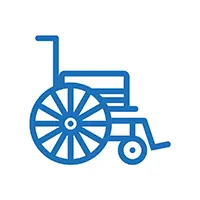Published 04 April 2019
View the Finding joy in wheelchair rugby transcript.
Henry Matthews wants to show the world that wheelchair users can do anything they put their minds to.
Originally from Auckland but now living in Palmerston North, Henry is the president of Manawatu Wheelchair Rugby.
He loves the sport with a passion and believes it’s important for everyone to find an activity they enjoy.
Learning to live with disability
After becoming tetraplegic 28 years ago – at age 18 – Henry initially lived in a state of denial.
He was injured after diving into shallow water at Matauri Bay, Northland.
Henry says it took him two years to get used to his new life in a wheelchair.
“[It] was so hard... didn't really wanna go outdoors, just wanna stay inside.
“The first couple of years was denial. Why me? Had a good job, and I was just on holidays… [I] never thought… it would happen to me.”
He says he had to learn how to get active again.
“And if it wasn't for a couple of guys, and ladies who come in and talk to ya, and say life is not over, unless you want it to be… if it wasn't for them, I don't think I'd be here today.”
Overcoming barriers
Henry discovered some challenges to living with a disability.
“I'd go into a shop and ask for something and I'd have my caregiver with me, and instead of asking me what I want they'll ask the caregiver, because they don't know what sort of disability I've got.
“They might think I've got a head injury or something.”
Henry says a lot of people also stared at him. He says he also used to have a fear of people in wheelchairs before he started using one himself, so he understands where the fear comes from.
And what does Henry say to those people now?
“I just say to them please, man, talk to them. Don't be afraid.”
Discovering wheelchair rugby
Henry found out about wheelchair rugby through a person he met while in the spinal unit recovering from his injury.
“He says come along and have a go… I went and had a look and… looked at him and said, you’re crazy.
“The things they were doing was unbelievable. You know, these guys smashing each other, falling out of chairs and… these guys were crazy I was going like, ‘you’ve broken your necks mate, why would you go and smash yourself around like that?”
But Henry soon fell in love with the physical intensity of the sport and has never looked back.
He was involved in the Wheel Blacks development squad in the mid-1990s and has since gone on to play and coach in various parts of New Zealand.
What is wheelchair rugby?
Wheelchair rugby isn’t just regular rugby but in wheelchairs - it’s a cross between rugby, basketball and handball.
Players compete in teams of four to get the ball to cross the goal line.
Contact between players is allowed, and even encouraged. You have to block other players and hold opponents, so contact is an important part of the game.
The wheelchairs are manual and are specially designed for the sport.
The game was initially developed in Winnipeg, Canada, in 1977 by two quadriplegic athletes who wanted an alternative to wheelchair basketball.
They wanted a game that would allow players with limited arm and hand function to participate equally.
Originally called Murderball, the name was later changed to wheelchair rugby.
To be eligible for play, players must have impairment in all four limbs. Most players have a spinal injury with full or partial paralysis of the legs, and partial paralysis of the arms.
Men and women play on the same team.
Each player is graded according to their level of muscle function from a scale of 0.5 (low muscle function) to 3.5 (higher muscle function). The maximum number of points for each team is eight on the court at one time.

Photo: Matt (left) and PJ (right) from the Invictus team with Henry (centre) at a Manawatu wheelchair rugby training in 2018.
Having a strong support network
Henry is grateful for the people who supported him after he was injured, particularly the staff in the spinal unit who gave him a reason to keep going.
He says his wife, Sue, has also been hugely supportive.
“I met Sue through the spinal unit and… if it wasn't for her, I don't know where I'd be. Probably six feet under, I dunno.
“We've been married for 21 years now, and I've been in a chair for 28 years. So yeah, a lot of love there.”
The importance of trying new things
Henry is a passionate advocate for taking risks and giving things a go.
He encourages people who have limited mobility to get out there anyway and try something new.
“Go out and get proactive. There's plenty of time to sit in front of the TV.
“A lot of people in wheelchairs, you know, they can do anything, if you put your mind to it."














